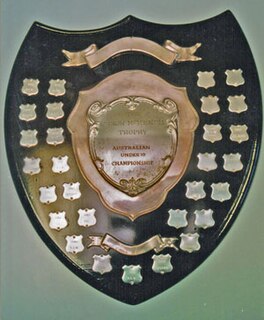Softball in Australia is played in Australia.
Softball is played in Queensland .
Softball is played in New South Wales, introduced to the state in 1939. By 1984, there were 1,356 registered teams in New South Wales. Players from Australia have been on the men's and women's national team, had AIS scholarships, played at universities in the United States, and professionally in the USA, Japan and Europe.
Softball is played in the Australian state of Victoria.
Softball is played in Tasmania. The game was brought to the island during the late 1940s from Melbourne, Victoria. The sport would grow in popularity in Tasmania with 56 teams in 1976 to 216 in 1984. Men's softball is not popular in Tasmania. The first softball only facility was built in Tasmania in 1984.
Softball is played in South Australia.
Softball is played in the Australian Capital Territory. The game was influenced early in its history in the territory by Queanbeyan. There are efforts to increase participation in the sport in the ACT. The territory has won the Gilleys Shield three times in a row. Players from Canberra have been on the national team, held Australian Institute of Sport scholarships and played for American universities.
Softball is played in the Northern Territory, Australia.
The Australia men's national softball team is the national softball team of Australia. They are nicknamed the Australian Steelers. The team is governed by Softball Australia and takes part in international softball competitions.
Zimbabwe men's national softball team is the national team for Zimbabwe. The 1988 World Championships were held in Saskatoon, Canada. The team played 13 games in the round robin round. Australia beat Zimbabwe 2-0 in one game in this round.
Chinese Taipei men's national softball team is the national team for Chinese Taipei. The 1988 World Championships were held in Saskatoon, Canada. The team played 13 games in the round robin round. Australia beat Chinese Taipei 2-0 in one game in this round. The 1992 World Championships, the eighth time the event was competed for, was held in Manila. Australia beat Chinese Taipei 9-2 in one game in the first round robin round. They finished with 4 wins and 4 losses. The team competed at the 1996 ISF Men's World Championship in Midland, Michigan where they finished with 4 wins and 6 losses. The team competed at the 2000 ISF Men's World Championship in East London, South Africa where they finished fifteenth.
The 1988 World Championships were held in Saskatoon, Canada. The team played 13 games in the round robin round. Australia beat the Virgin Islands 11-1 in one game in this round.
Cuba men's national softball team represents Cuba in international softball competitions. The team played at the 1988 World Championships were held in Saskatoon, Canada. They played 13 games in a round robin tournament, and beat Australia 7-4 in one game.
Guam men's national softball team is the national team for Guam. The 1992 World Championships, the eighth time the event was competed for, was held in Manila. Australia beat Guam 7-2 in one game in the first round robin round.
Indonesia men's national softball team is the national team for Indonesia. The 1992 World Championships, the eighth time the event was competed for, was held in Manila. Australia beat Indonesia 5-4 in one game in the first round robin round. The team competed at the 2009 ISF Men's World Championship in Saskatoon, Saskatchewan where they finished sixteenth.
Czechoslovakia men's national softball team is the national team for Czechoslovakia.
Bahamas men's national softball team is the national team for Bahamas. The 1988 World Championships were held in Saskatoon, Canada. The team played 13 games in the round robin round. They finished sixth overall. The team competed at the 1996 ISF Men's World Championship in Midland, Michigan where they finished with 5 wins and 5 losses.
The British Virgin Islands men's national softball team is the national team for the British Virgin Islands. The 1988 World Championships were held in Saskatoon, Canada. The team played 13 games in the round robin round, finishing twelfth overall.
Bermuda men's national softball team is the national team for Bermuda. The 1988 World Championships were held in Saskatoon, Canada. The team played 13 games in the round robin round. They finished thirteenth overall.








